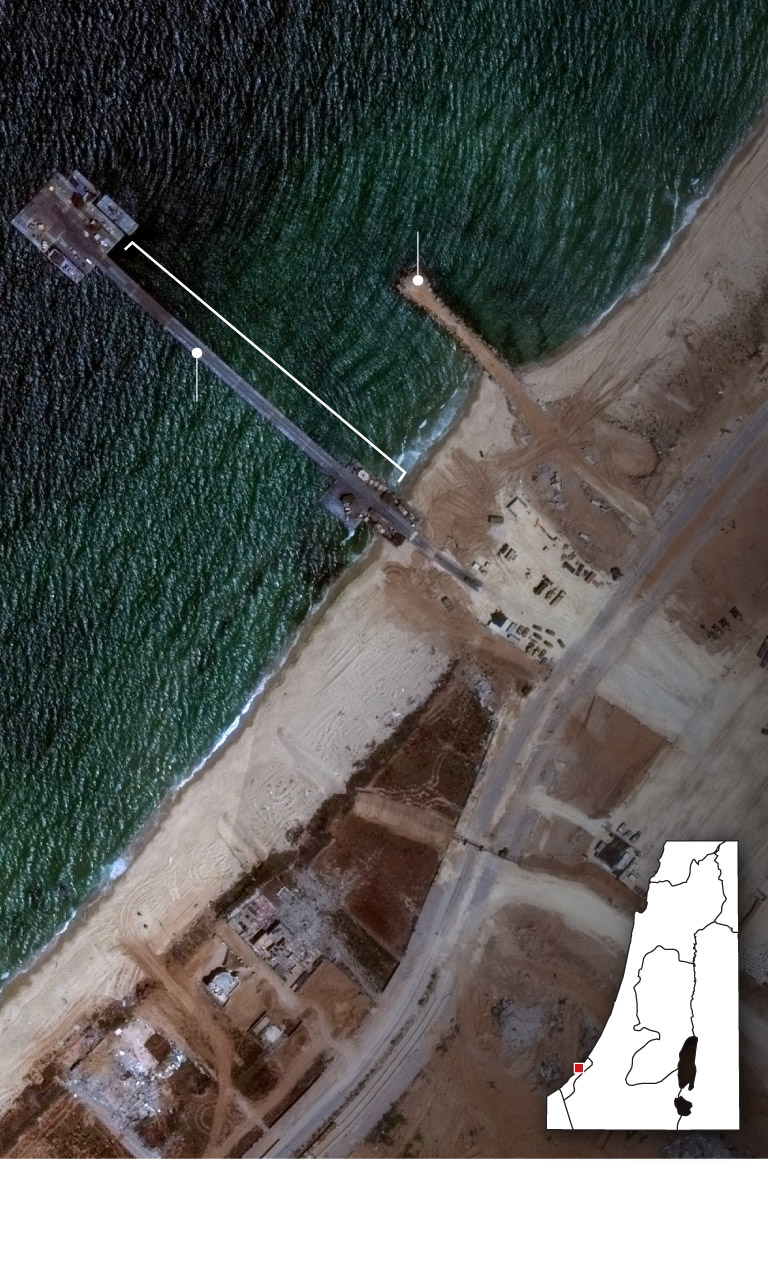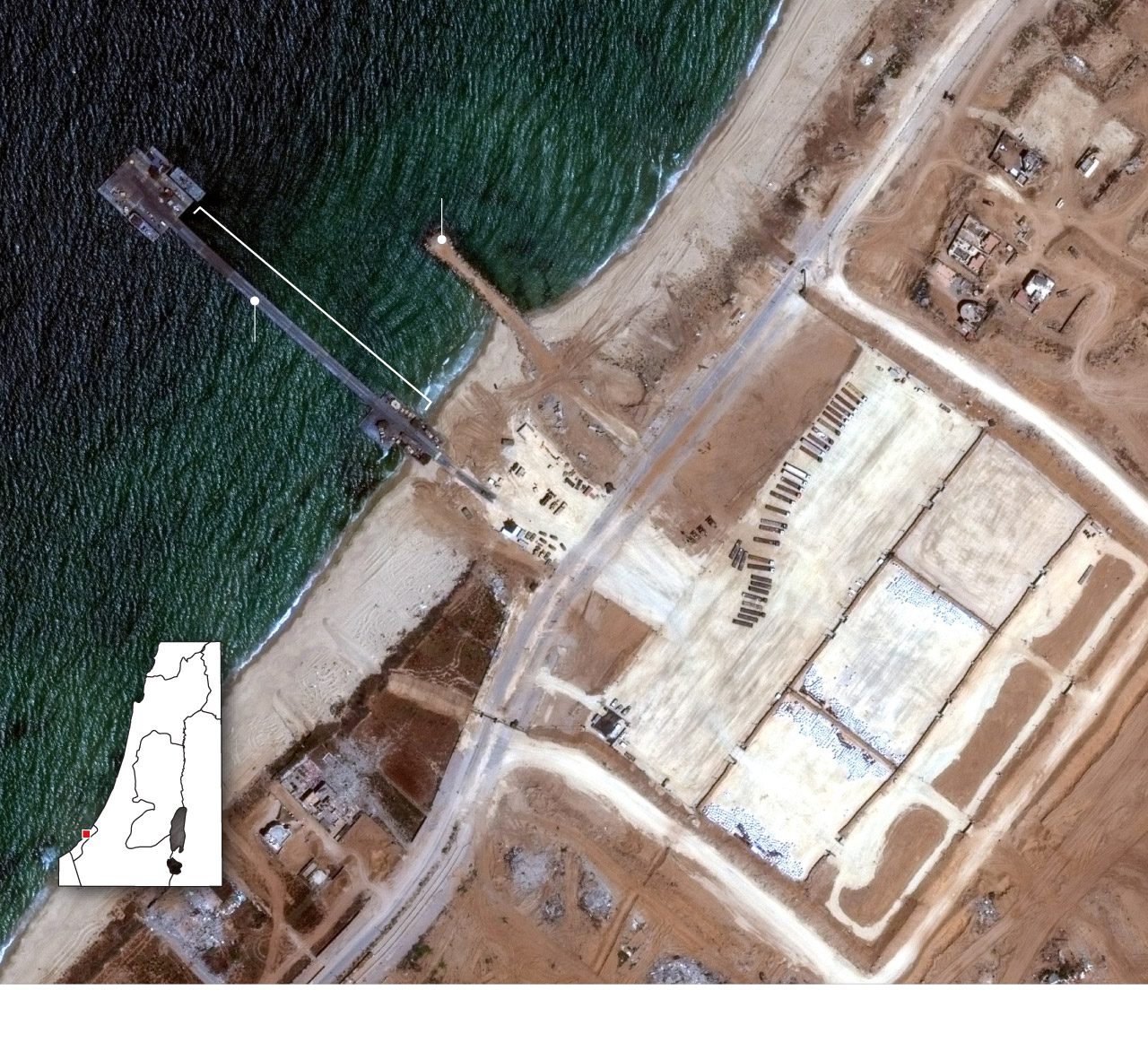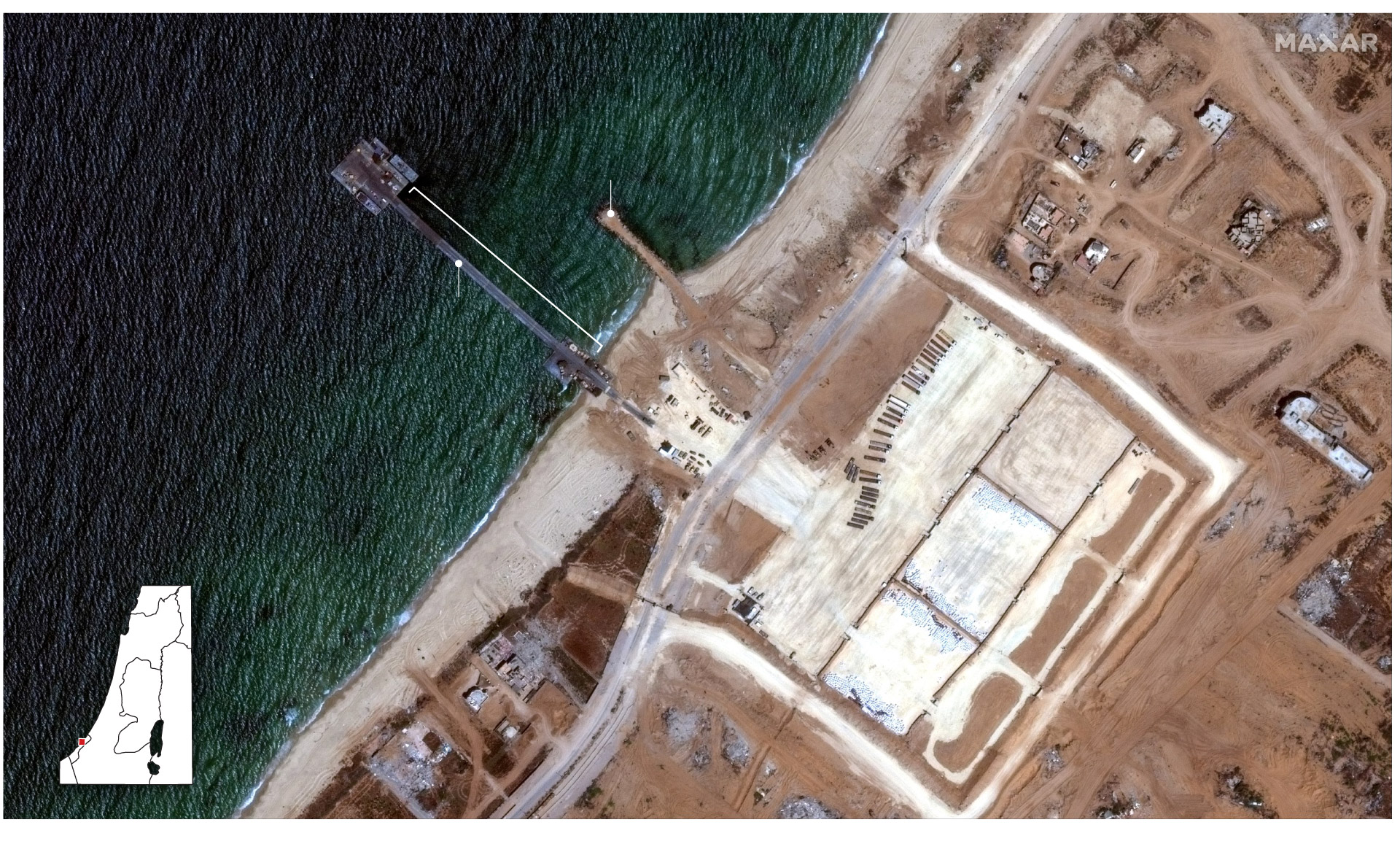The Centcom statement described it as “the largest single day delivery of aid to date” — about the equivalent 38 truckloads. Aid groups estimate that the battered Gaza Strip requires hundreds of truckloads a day to support the more than 2 million people trapped inside. The Pentagon originally said it would be delivering up to 1,700 tons a day via the pier.
Jetty built by World
Central Kitchen
Source: Maxar Technologies/Handout via REUTERS
SAMUEL GRANADOS / THE WASHINGTON POST

Jetty built by World
Central Kitchen
Source: Maxar Technologies/Handout via REUTERS
SAMUEL GRANADOS / THE WASHINGTON POST

Jetty built by World
Central Kitchen
Source: Maxar Technologies/Handout via REUTERS
SAMUEL GRANADOS / THE WASHINGTON POST

Jetty built by World
Central Kitchen
Source: Maxar Technologies/Handout via REUTERS
SAMUEL GRANADOS / THE WASHINGTON POST
The pier, which Centcom says has been used to deliver 4,160 tons of humanitarian aid to date, is part of a broader effort by the Biden administration to get food and other lifesaving necessities to starving Gazans as the humanitarian situation worsens and the enclave remains largely sealed off. But it is challenging to use when waves exceed 2 to 3 feet in height, according to past assessments in military journals.
Critics have argued that instead of constructing the pier, the administration could have delivered aid into Gaza faster and at less cost by pressuring the Israeli government to ease restrictions on aid moving through land routes. Georgios Petropoulos, head of the U.N. humanitarian coordination office in Gaza, told The Post that the pier operation “was a failure.”
GET CAUGHT UP
Stories to keep you informed
“Let’s be honest with ourselves. It’s much to do about nothing. Distracted us for three months,” he said, adding that it was not yet serving the interests of people in the Gaza Strip.
The floating pier was first announced by President Biden in his March State of the Union address, and construction was completed in May. The project cost an estimated $230 million.
In late May, the pier was ripped apart by bad weather, causing an estimated $22 million in damage and sidelining the operation for days while it was repaired. Earlier this month, it was again partly dismantled and towed to shelter in the Israeli port of Ashdod to avoid forecast bad weather and to “ensure the structural integrity of the pier and safety of our service members,” Centcom said.
Another issue has been the suspension of operations by the United Nations’ World Food Program, partly responsible for the distribution of aid arriving from the pier, after an Israeli hostage rescue operation on June 8 freed four hostages and left more than 250 Palestinians dead. The WFP is expected to resume work pending a review “to ensure that secure conditions for humanitarian work can be reestablished,” U.N. spokesman Farhan Haq has said.
The Coordinator of Government Activities in the Territories (COGAT), the Israeli agency responsible for aid delivery to Gaza, reported that 324 truckloads of aid passed through the Kerem Shalom crossing in the south. But aid agencies have said it is difficult to collect because of the ongoing fighting inside Gaza as well as the increased lawlessness of the desperate population.
Israel announced a daily pause in combat operations earlier this week to facilitate the delivery of aid, but WFP Executive Director Cindy McCain told Al-Monitor in an interview Thursday that it made little difference. “We haven’t been able to get in,” she said. “We’ve had to reroute some of our trucks. They’ve been looted. As you know, we’ve been shot at, and we’ve been rocketed. So far as we can tell, there’s no difference at all.”
Aid group Doctors Without Borders said Friday that it may need to “stop or drastically reduce some of its medical activities” in Gaza as it has been unable to bring any medical supplies into the strip since the end of April due to the Israeli closure of the Rafah crossing.
“We have six trucks filled with 37 tons of supplies — the vast majority of which are essential medical items — that have been waiting since June 14 on the Egyptian side of Kerem Shalom crossing point, unable to cross into Gaza where they are needed to save lives,” Guillemette Thomas, medical coordinator with the group, said in a statement.
On the political scene, a war of words appears to have erupted between the United States and Israel this week, as Washington hit back after Israeli Prime Minister Benjamin Netanyahu criticized the slow delivery of U.S. weapons.
Netanyahu said in a social media video this week that it was “inconceivable that in the past few months the [Biden] administration has been withholding weapons and ammunition to Israel.”
National Security Council spokesman John Kirby told reporters Thursday that he was unaware the video was coming and called it “perplexing,” given the volume of U.S. military support to Israel. “It was vexing and disappointing to us as much as it was incorrect,” he said. “There’s no other country that’s done more but will continue to do more than the United States to help Israel defend itself.”
Characterizing Kirby’s comments as a personal attack, Netanyahu said he was “willing to absorb personal attacks if that is what it takes for Israel to get the arms and ammunition it needs in its war for survival.”
Netanyahu said in an interview with Punchbowl News published Friday that he was “appreciative” of U.S. military aid but that he had tried talking with the president to resolve what he maintained was a slowdown in weapons deliveries. “I felt that airing it was absolutely necessary after months of quiet conversation that did not solve the problem,” he added.
Armenia has become the latest country to recognize the state of Palestine. In a statement carried by local media outlets Friday, Armenia’s Foreign Ministry said the country has “always advocated for a peaceful and comprehensive settlement of the Palestinian issue” and that a two-state solution “is the only way to ensure that Palestinians and Israelis can realize their legitimate aspirations.” The news was welcomed by Palestinian politicians, while Israel’s Foreign Ministry said it summoned Armenia’s ambassador “for a reprimand.”
Israeli forces continued to push into the city of Rafah on Friday, while also conducting operations in the previously conquered areas of Gaza City and Khan Younis. The army said it engaged in close-quarters combat with Hamas fighters and was conducting operations in the Rafah area. Earlier this week, Israel said it was close to achieving its goals in the southern Gaza city, which it says is Hamas’s final stronghold.
25 people were killed and 50 injured in Israeli strikes on tent camps in Mawasi, near Rafah, the Palestinian Health Ministry said Friday. The tent camp housed displaced people from across Gaza. In a statement early Friday, the Israeli military characterized its operations near Rafah as “precise” and “intelligence-based.”
The Palestinian Ministry of Health said it has begun rehabilitation work at al-Shifa Hospital, following its closure in March after raids by Israel’s military. Moatasem Salah, head of the Health Ministry’s Emergency Committee, told The Post that the kidney department has been partially restored, increasing its capacity from seven to 17 cases. “We have started renovating the outpatient clinics building to serve as an emergency medical point,” Salah said. “However, we lack essential facilities such as a laboratory, X-ray equipment, an operating room and accommodation for patients.” In parallel efforts, the nonprofit Patient’s Friends Association said it rehabilitated a private hospital in Gaza City to treat children and is planning to expand its capacity to handle maternity cases. There are no functioning hospitals in Rafah.
At least 37,431 people have been killed and 85,653 injured in Gaza since the war started, according to the Gaza Health Ministry. It does not distinguish between civilians and combatants but says the majority of the dead are women and children. Israel estimates that about 1,200 people were killed in Hamas’s Oct. 7 attack, including more than 300 soldiers, and it says 312 soldiers have been killed since the launch of its military operations in Gaza.
Miriam Berger contributed to this report.
